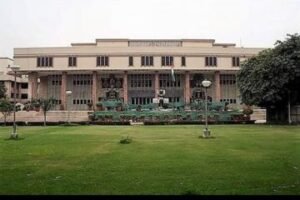It Has Never Been The Effort Of Courts To Make Death Penalty Redundant Or Non Existent
Case: Manoj Pratap Singh vs State of Rajasthan
Coram: Justices AM Khanwilkar, Dinesh Maheshwari and CT Ravikumar
Case No.: Crl.A. No. 910 – 911 – 2022
Court Observation: “The quest for justice in such cases, with death sentence being awarded and maintained only in extreme cases, does not mean that the matter would be approached and examined in the manner that death sentence has be avoided, even if the matter indeed calls for such a punishment.”
“The judicial process, in our view, would be compromising on its objectivity if the approach is to nullify the statutory provision carrying death sentence as an alternative punishment for major offences (like that of Section 302 IPC), even after it has passed muster of judicial scrutiny and has been held not unconstitutional. The pursuit in collecting mitigating circumstances could also not be taken up with any notion or idea that somehow, some factor be found; or if not found, be deduced anyhow so that the sentence of death be forsaken. Such an approach would be unrealistic, unwarranted and rather not upholding the rule of law. “
“Again, there cannot be any universal formula for calling for a report in terms of the said decision in Anil. For example, in the present case, where the appellant is found to be indulging incessantly in criminal activities before the crime in question; has carried out gruesome deeds of the present crime; has further been involved in questionable jail conduct, including quarreling with a fellow inmate and earning 7 days’ punishment; and then, to cap it all, has been involved in an offence of no less degree than murder of another jail inmate, calling for any further report of the likelihood of reformation and rehabilitation of the appellant could be proposed only if the judicial process is determined to annul the death sentence altogether, by finding one way or the other to avoid the same in every case. Such an approach would be counter-productive to the entire system of maintenance of order in the society; and could be countenanced only if we would be inclined to think that whatever be the society’s cry for justice, the statutory provision of death sentence should itself be given its interment or burial. Obviously, this approach would be squarely contrary to the statutory mandates as also the principles enunciated by multiple Constitution Bench decisions of this Court; and would strike at the roots of the rule of law. In the given set of circumstances of this case, the suggestions about calling for any so called psychological evaluation report could only be termed as impractical and unrealistic and could only be rejected.”
“In the case based on circumstantial evidence, the conclusion of guilt is recorded only after the circumstances are found to be forming an unbreakable chain, so consistent as to rule out any other hypothesis except the guilt of the accused. These being stringent norms, as followed consistently by the Courts based on the panchsheel principles expounded in Sharad Birdhichand Sarda (supra), and requirement being of the proof of the case beyond reasonable doubt, theoretically there is no scope for any ‘residual doubt’ operating even in the cases of circumstantial evidence. The cases in which theory of residual doubt has at all been referred, had been standing on their own facts, where alternative to death sentence was considered appropriate. However, while taking up the matter for sentencing, it is not expected to reopen the chain of circumstantial evidence to find any weak link which may fall in the category of residual doubt. Needless to reiterate that if at all any such doubt is reasonably existing, the very basis of conviction would be in question. To put it in other words, after the final conclusion on the guilt and after pronouncing conviction, no concept of residual doubt as such is available for the purpose of sentencing.”
Previous Posts
Medical Professionals Cannot Be Held Negligent Merely Because The Treatment Is Not Successful Or Patient Dies During Surgery: Supreme Court Download Judgement
Keywords
Death Penalty, Redundant, Courts To Make Death Penalty Redundant




